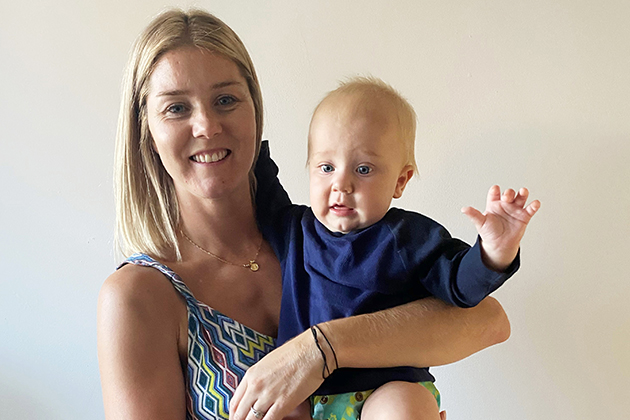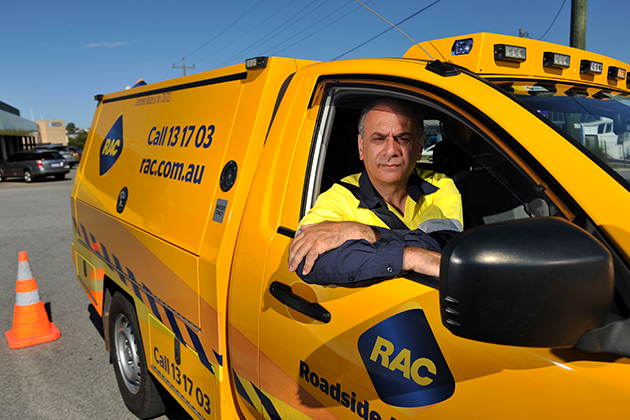4 February, 2020 By: Kirsty Petrides
It’s a mild day in Perth, and new mum Kobi has just returned to her car after taking three-month old Tully to his first swimming lesson.
With her hands full juggling the baby-bag, pram and Tully’s wet swimming clothes, Kobi fumbles around for her car keys and feels her way to the unlock button.
Upon opening the back passenger door, she throws the keys over onto the front seat, and now – with her hands slightly more free - secures Tully into his baby-seat, loads up the bag and pram into the car, and shuts the door.
And it'd during those few seconds when Kobi is walking around the rear of the car to the driver’s side door that she hears it. The ‘click’ of her Skoda’s central locking system, her keys still sitting on the front seat.
“I wasn’t even a metre from the driver’s door when I heard it go,” Kobi says.
"All the windows were up, I couldn’t pry my way back in. I felt physically sick."
Kobi’s situation is not uncommon. Each year, RAC rescues on average 440 Western Australian kids accidentally locked in cars.
The temperature inside the car can rise rapidly in an incredibly short period of time. Tests have shown the internal temperature of a vehicle can rise from air conditioned to ambient temperatures in as little as two minutes, and on a 32 degree day the cabin temperature can get to 40 degrees in as little as seven minutes*.
Director of the Telethon Kids Institute and paediatrician, Professor Jonathan Carapetis, says this is especially dangerous for infants, as they are not yet able to regulate their body temperature the way adults can.
“It can have very serious consequences for their health. They’ll certainly dehydrate, they’ll certainly get sick and it can be lethal,” Professor Carapetis says.
For new mum Kobi, this was all too much.
“I just went into panic,” she explains.
“I had a friend from the swimming lesson across the car park still loading up her car and she could see something was wrong. She went straight back in to the swimming centre to ask for help, and they said to call RAC immediately.

“I wasn’t an RAC member though, but they said to still call anyway.
“When we got through, RAC said they were prioritising the job and someone would be there in 15 minutes. When I got off the phone, Tully had started crying in the backseat and was clearly distressed.
“By that stage, I wasn't thinking very clearly. My friend was still with me and calming me down, but it was incredibly stressful.
“Thankfully RAC then called me back to say it was only going to be 10 minutes so we didn’t have a long wait.”
However, when the Roadside Assistance Patrol arrived, they hit a stumbling block - the car’s central locking system was faulty.
“I knew the unlock button was broken, it had been broken for a while,” Kobi says.
“Pressing it once didn’t unlock the car for some reason, but I had just figured out that if I pressed it twice it would unlock.
“The RAC Patrol wedged open the door, stuck a long piece of wire down and tried to press the unlock button on the car key. But trying to press a button twice in quick succession with a piece of wire stuck down a gap in a car door is obviously incredibly difficult.
“It just wasn’t going to happen.”
Thankfully, Kobi’s car key did have a properly functioning boot unlock button, and Kobi’s friend (who was still by her side) happened to have a particularly petite frame.
“The RAC Patrol hit the boot unlock button with the wire stick, my friend climbed into the boot and squeezed herself through the gap between the boot and the backseat, and then opened the back passenger door from the inside.”

Tully was fine, albeit a bit distressed. And Kobi, while still distressed herself, was shocked at just how easy it was for this situation to occur.
“I used to do that most days,” she admits.
“I would unlock the car and pop my keys on the driver’s seat and while I’m doing other things because I just need my hands free.
“As a parent, it’s so easy to have a lapse in concentration. You’ve got so many things to think about, like prams, bags, wet clothes and – after swimming lessons - a tired wet baby.
"It's much easier to accidentally do this than you think."
As someone who has experienced this firsthand, Kobi’s advice is quite simple – get to know your car.
With advancing vehicle technology, our owner’s manuals can seem too overwhelming to even consider looking at. At times it’s almost as if they’re written in a different language.
As a result, we often avoid them completely and therefore aren’t aware of what our cars are capable of.
“Find out what your car can do, because we didn’t even know the car automatically locked itself that quickly,” Kobi says.
“These days, I know exactly what my car can do. If I hold the unlock button down, it opens all the windows. So, I do that every time I’m getting in or out of the car with Tully now, and then once we’re ready, I close all the windows again.
“If you do find yourself in this situation though, call RAC.
“I knew that RAC would come help me, but I didn't think it would be for free when I wasn’t even a member. The Patrol just came and did it, and while I was getting Tully out the car, he just packed up and went on his way. I stopped him and asked him what I owed him, but he said, ‘nothing at all.’
“That was a huge sense of relief because I thought I’d be left with a huge cost too.
“Also seek help from bystanders if you can. Don't hesitate to tell people. People might be afraid because it might come with a bit of shame, but having people stay with you and keep you calm is very helpful.”
We rescue 440 WA kids accidentally locked in cars each year
To avoid an accidental lock in, remember to keep your keys on you.
